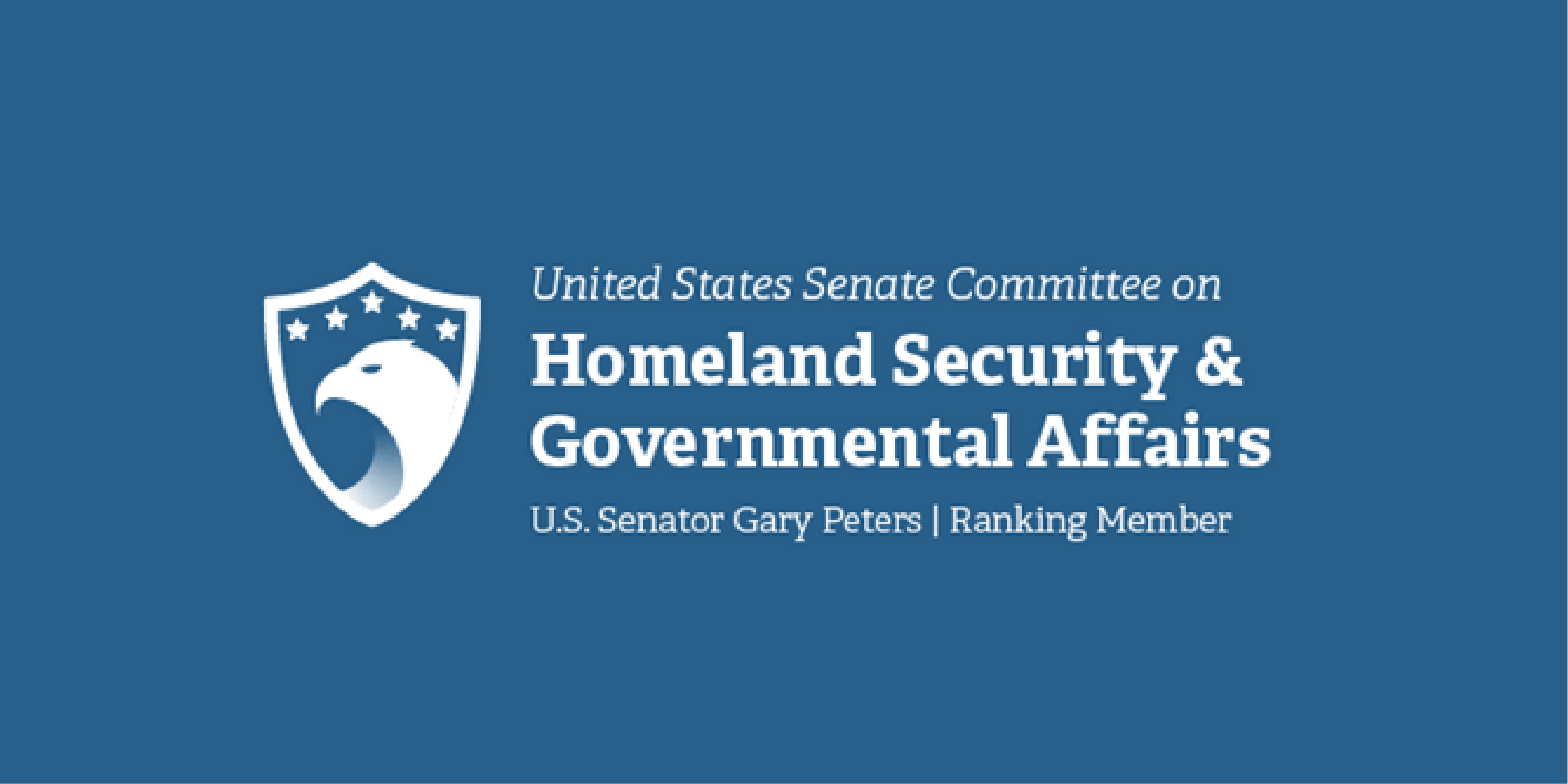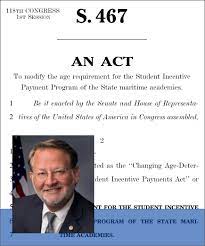
Peters’ Bill Would Expand Eligibility for State Maritime Academies’ Student Incentive Payment Program; Michigan is Home to One of Six National Maritime Academies
WASHINGTON, DC – Bipartisan legislation authored by U.S. Senator Gary Peters (MI) to expand the age eligibility for the Maritime Administration’s Student Incentive Payment Program is headed to the President to be signed into law, after passing the U.S. House of Representatives. The House companion legislation was introduced by U.S. Representative Jack Bergman (R-MI-1).
The Changing Age-Determined Eligibility to Student Incentive Payments (CADETS) Act – which Peters reintroduced with U.S. Senators Todd Young (R-IN), Amy Klobuchar (D-MN), Tammy Baldwin (D-WI), Ted Cruz (R-TX), and Mike Braun (R-IN) – would expand the Student Incentive Payment Program eligibility age for financial assistance to cadets who attended one of the six State Maritime Academies and commit to a post-graduation service obligation to include any qualified student who will meet the age requirements for enlistment in the U.S. Navy Reserve at their time of graduation. In return for their commitment to serve, cadets can receive up to $32,000 in this incentive payment funding over four years to help offset the cost of tuition, uniforms, books, and living costs. The Great Lakes Maritime Academy – one of the six national academies – is based at Northwestern Michigan College in Traverse City. The bill, which the Senate Commerce, Science, and Transportation Committee advanced in March, passed the Senate last Congress.
“Graduates of these prestigious academies go on to play a critical role in strengthening our robust maritime sector in Michigan, our economy, and national security,” said Senator Peters, a member of the Senate Armed Services Committee and former Lieutenant Commander in the U.S. Navy Reserve. “My bipartisan bill will incentivize more cadets to continue serving their country after graduation, while helping them receive a high-quality, affordable education.”
“This commonsense bipartisan solution will expand opportunities for Veterans and older students who wish to become mariners – a crucial national security need – and will greatly benefit Michigan’s maritime industry,” said Representative Bergman.
“The six State Maritime Academies are grateful to Sen. Peters’ CADETS Act,” said Admiral Jerry P. Achenbach, Superintendent, Great Lakes Maritime Academy. “This Act will allow military veterans and non-traditional students to be eligible for compensation for agreeing to serve the United States as commissioned officers in the Navy's Strategic Sealift Officer Program upon graduation. Additionally, it addresses the current shortage of licensed officers in the U.S. Merchant Marine. Sen. Peters' dedication to the CADETS Act is greatly appreciated, and will benefit veterans and non-traditional students not only in Michigan, but across the nation.”
“The Lake Carriers’ Association and its member companies strongly support Senator Peters’ bill encouraging more Michiganders and Americans to join the U.S. maritime industry,” said Jim Weakley, President, Lake Carriers’ Association. “Those men and women who delayed college to serve their country should not be denied opportunities given to younger, more recent high school graduates. This common-sense legislation is long overdue and we greatly appreciate Chairman Peters’ leadership.”
“The CADETS ACT is the definition of good legislation and takes yet another step towards ensuring our veterans have meaningful and far reaching career opportunities,” said Paul LaMarre III, Director, Port of Monroe. “As a veteran and merchant mariner I can attest that the leadership skills developed in the military are as essential to the sustainability of the Great Lakes maritime industry as the men and women who breathe life into it.”
Current Student Incentive Payment Program age requirements prohibit cadets older than 25 from participating in the program. State Maritime Academies have programs to recruit former military veterans and servicemembers, but most of these cadets are too old to qualify for this funding. As a result, older students—many of whom are veterans—therefore do not qualify for this program due to their age. Senator Peters’ CADETS Act would expand the eligibility age to include any qualified student who will meet the age requirements for enlistment in the U.S. Navy Reserve at their time of graduation, and ensure that high-performing, non-traditional cadets can receive this funding.
In the U.S. Senate, Peters has been a strong advocate for the United States’ maritime military institutions as well as the maritime sector. Peters is Chairman of the Surface Transportation, Maritime, Freight, and Ports Subcommittee of the Senate Commerce, Science, and Transportation Committee. Peters was recognized by the Navy Supply Corps Foundation Board of Directors as the 60th Navy Supply Corps Foundation Distinguished Alumnus. In 2018, Peters’ legislation to reauthorize the Maritime Administration – the federal agency responsible for promoting and maintaining a strong U.S. commercial maritime industry – was signed into law. The legislation required a competitiveness study to make recommendations for improving the Great Lakes and St. Lawrence Seaway system—one of the most heavily traveled waterways in the United States—and increased training opportunities for United States Merchant Marine Academy cadets.
###
Peters’ Bipartisan Legislation to Help Protect Consumers from PFAS Chemicals Advances in Senate
WASHINGTON, DC – Bipartisan legislation authored by U.S. Senator Gary Peters (MI) to help protect consumers from toxic per- and polyfluoroalkyl substances (PFAS) has advanced in the Senate. The bill passed in the Senate Homeland Security and Governmental Affairs Committee, where Peters serves as Chairman, and now moves to the full Senate for consideration.
Peters’ Protecting Consumers from PFAS Act – which he introduced with U.S. Senators Susan Collins (R-ME), Peter Welch (D-VT), and Cynthia Lummis (R-WY) – would add the Consumer Product Safety Commission (CPSC) to the list of federal agencies required to participate on the PFAS Interagency Working Group, which Peters helped establish in 2021 to improve coordination between federal agencies to address PFAS contamination. The Consumer Product Safety Commission is the federal agency tasked with protecting the public against any injury or harm associated with consumer products such as water-resistant clothing, non-stick cookware, and other products that may contain PFAS chemicals – which can lead to serious health effects including cancer, low infant birthweight, liver and kidney issues, and reproductive and developmental problems.
Peters’ bipartisan bill would help better protect consumers against these harmful chemicals by ensuring that the Consumer Product Safety Commission is involved in the coordination of federal efforts to strengthen PFAS research and development, determine best practices for remediation, and identify key challenges to reducing the environmental and human health impacts of PFAS.
“It’s important that we take a comprehensive, all-hands on approach to addressing PFAS chemicals, which have been found in our everyday items from clothing to cleaning supplies to non-stick cookware to dental floss,” said Senator Peters. “That’s why the Senate must pass my bipartisan bill to ensure the Consumer Product Safety Commission has a seat at the table as we work to eliminate these dangerous toxins and protect public health and safety.”
“Requiring the Consumer Product Safety Commission to be part of the interagency PFAS working group would ensure CPSC can collaborate on important PFAS research and information sharing, which will help them to evaluate ways to remove, replace or substitute PFAS from consumer products,” said Abigail Hendershott, Executive Director of the Michigan PFAS Action Response Team. “This is especially important for States, including Michigan, who support and advocate a national approach to addressing PFAS in consumer products.”
“Toxic PFAS contamination presents a health crisis in Michigan and around the country. As we work to eradicate PFAS from our air, water, and land, we must also ensure our everyday products like shampoo and cleaning supplies are free from these harmful chemicals,” said Bentley Johnson, Federal Government Affairs Director for the Michigan League of Conservation Voters. “Michigan LCV stands with Senator Peters in ensuring the Consumer Protection Safety Commission has a voice in federal policymaking to better protect consumers from products containing PFAS.”
“The Great Lakes PFAS Action Network supports this bill which will codify CPSC’s participation in the PFAS Interagency Working Group,” said Cathy Wusterbarth, Community Leader for the Great Lakes PFAS Action Network in Oscoda, Michigan. “Consumer products are a major source of PFAS exposure and can end up in our landfills which too often leach PFAS chemicals into nearby water. We applaud Senator Peters for leading this bill to ensure the agency has a seat at the table in considering coordination and goals for federal PFAS research so they can better protect the public against PFAS in consumer products.”
Currently, the Consumer Product Safety Commission is represented on the PFAS Interagency Working Group, but is not required to be by law. As public awareness and our understanding of these dangerous chemicals continue to grow and evolve, Peters’ bipartisan bill would take a commonsense step to ensure the best interests of consumers are accounted for and future federal efforts to address PFAS are conducted using a product safety lens.
This bill builds on Peters’ long-running efforts to address PFAS contamination. In September 2018, Peters helped convene the first-ever hearing on PFAS contamination in the Senate, which assessed the federal government’s response to PFAS contamination and remediation efforts. He then convened a field summit in Grand Rapids in November 2018 to shine a light on how local, state and federal governments are coordinating responses to address PFAS contamination. Peters additionally convened a hearing as Chairman of the Homeland Security and Governmental Affairs Committee to examine how servicemembers, their families and communities across the country have been harmed by exposure to toxic PFAS substances connected to military sites. During the hearing, he raised the need to hold the Department of Defense (DoD) accountable for their failure to act. He also previously supported and led provisions in the national defense bill to prohibit DoD from purchasing or using firefighting foams containing PFAS chemicals for military training exercises, and enhanced state cooperation DoD to clean-up PFAS contamination stemming from military-related activities.
Peters additionally introduced and enacted into law bipartisan legislation to reduce the spread of PFAS chemicals at commercial airports. The Preventing PFAS Runoff at Airports Act will deploy more existing Federal Aviation Administration (FAA) funding for commercial airports to purchase devices necessary to test their firefighting equipment without discharging toxic PFAS chemicals. This built on Peters’ provision previously signed into law, allowing airports to discontinue use of fire-fighting foams containing PFAS. In 2022, Peters’ bill to help protect firefighters and emergency responders from PFAS exposure in the line of duty was also signed into law. Peters additionally previously reintroduced bipartisan legislation to help advance the federal government’s understanding of PFAS and better inform plans to effectively address PFAS contamination.
In the government funding bill signed into law in December 2022, Peters pushed for continued efforts to address PFAS contamination. The law included $5 million for the Department of Agriculture to support efforts to address PFAS contamination in agriculture. It also included $2.7 million for the U.S. Geological Service to conduct research on the transmission of PFAS substances in watersheds and aquifers, and $2 million for the National Institute of Environmental Health Sciences to continue their work on PFAS and other contaminants of concern. Peters also helped secure funding for two local public projects in Oscoda Township and Marquette County that will help communities remediate and address longstanding issues with PFAS contamination. Finally, Peters helped welcome $37 million in federal grants to address PFAS in drinking water in February, made possible by the Bipartisan Infrastructure Law he helped enact.
###














